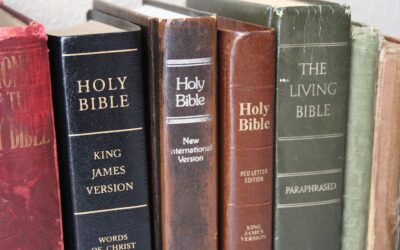Habakkuk is an often neglected book of the Bible. I’ll confess that before we studied it in the Bible Study Academy, I was unfamiliar with it. All I knew was that it paired well with Job, which we had studied the previous month. I had no idea what I was missing, and if you are in the same boat, I encourage you to study it out!
A Brief Summary of Habakkuk
The book of Habakkuk is three short chapters that begin with the prophet Habakkuk questioning God because the unrighteous Jews in Judah were oppressing the godly Jews. He was appalled by the treatment righteous Jews were receiving: violence, destruction, strife, contention, injustice. He took his concerns to the Lord because he didn’t see God working in their midst. But he didn’t realize he was about to hear what he least wanted to hear: God was going to send the Babylonians to conquer Judah.
In essence, God told Habakkuk, “You think this is bad? You ain’t seen nothin’ yet!” And He went on to describe the wicked Babylonians as a “bitter and hasty nation”; “dreaded and fearsome”; like leopards, wolves, and eagles; a nation that does whatever it wants with no regard for people or gods.
This leads into the second exchange between Habakkuk and God. Habakkuk was understandably disturbed by the news he heard from God, so he prayed. His fear was that the righteous would be swept up along with the wicked when the invasion occurred. After he brought his concerns to God, he waited for God to answer him.
And God did answer him. He told him that while He would use the Babylonians to judge the Israelites, He would also judge the Babylonians. He described the “five woes” of the Babylonians as an encouragement to Habakkuk that their sins against the Israelites would not go unpunished.
Habakkuk was so encouraged that the third chapter of the book is simply a prayer. He praised God for Who He is and what He has done. He remembered many of God’s mighty acts, and He chose to trust God even if his worst fears came true.
So what can we learn from studying this encounter between a prophet and his God?
God Is Sovereign
When Habakkuk first approached God, it was as if he didn’t think God knew what was going on. He echoed many of the Psalms when he asked “O LORD, how long?” But God not only acknowledged what was happening, He also had a plan for it.
It is important to notice in God’s response that the Babylonians were only able to conquer Judah because God allowed it. No matter how fierce and ruthless they were, the Babylonians were still subject to God’s sovereignty. We may look around and think the just are suffering while the wicked prosper, but we see such a small part of the tapestry that is eternity. God allows evil because it serves His purposes, and in the end, He (and by extension we) are victorious!
We also get a small taste of the doctrine of concurrence in this book because while God used the Babylonians to judge the Israelites, He also judged the Babylonians for their actions. The judgement of the Israelites was a correction, but the judgement of the Babylonians was annihilation.
God raises up nations, and He takes nations down. It is all in His hands.
Habakkuk Teaches Us How to Pray
It is interesting to see the progression of Habakkuk’s prayers through this short book. He prays three times, and each time, his relationship with God deepens.
In the first prayer, Habakkuk simply questions God: “God where are You? Don’t You see what’s going on?” It is a simple, heart-felt prayer, asking God for answers as he watches the injustice among God’s own people. It’s possible he didn’t even expect an answer.
After hearing from God, Habakkuk’s second prayer has more structure. He is still questioning God to make sure the answer He heard is really what God said because it seems unfathomable. But Habakkuk begins his second prayer by stating what he knows to be true about God: He is a covenant-keeping God, He is eternal, He is holy. Then he launches into his concerns about the impending invasion of the Babylonians.
Habakkuk’s third and final prayer in the book is straight worship. He recognizes that God is to be feared more than man. He asks God to bring revival in the in-between, while the Jews wait for their judgment. He lists many of God’s mighty works throughout history:
- The plagues in Egypt
- Crushing the enemies of Israel
- The parting of the waters
- The sun standing still for battle
In light of these things, while the coming judgment was scary, Habakkuk chose to trust God and His work. And he ends his prayer by changing his “what ifs?” to “even ifs”: Even if his worst fears come true and the righteous get swept up with the wicked, there is no food left for them to eat, there is no animal left in the stalls, he “will rejoice in the LORD” and “take joy in the God of my salvation.”
These prayers can guide us in our prayers:
- Beginning by stating what we know to be true about God puts our requests into perspective.
- We can come to Him authentically with our concerns and questions. He knows what they are anyway, so why not?
- Remembering His past actions and blessings helps us to see that He is capable of doing anything.
Habakkuk 2:1 is a pivotal verse in the lesson on prayer. Two mistakes we often make when we bring requests before God are 1) we don’t really expect an answer, or 2) we demand an answer (or worse, we demand the answer we want). Habakkuk was willing to wait for God’s timing and God’s way of answering his prayer. We don’t know how long he waited, but he expected it, and he accepted it when it came even though he didn’t like it.
Spending Time with God Changes Us
Comparing the Habakkuk at the beginning of the book to the Habakkuk at the end of the book is a bit shocking! He went from almost accusing God of being absent to trusting God wholeheartedly with his future. What brought about this change in him? Habakkuk spent time with God.
Having grown up in a pastor’s home, I was around the things of God all of the time. We were at church every time the doors were open. I sang in choirs, watched the kids in the nursery, taught junior church, participated in evangelistic campaigns, cleaned the building, you name it. If there was hole that needed plugged, my sisters and I plugged it.
But it has only been in times when I intentionally sought to spend time one-on-one with God that I have grown and matured in the Lord. For most of my life I was an immature Christian. And while I would never claim to have “arrived,” I can honestly say that the more time I spend with God in His Word, the more growth I experience.
When we spend time with God, it changes us. His Word is living and active; it pierces us to the division of soul and spirit; it discerns our thoughts and intentions (Hebrews 4:12); and it shows us what He wants for us. It can take us from trembling in fear of the future to trusting that whatever happens, He’s got it, just like it did with Habakkuk.
The Book of Habakkuk Is for Us Today
You might be wondering how we can take a private exchange between a prophet and God and apply it to our lives today. Yes, it was for the Israelites then, but the Babylonians won’t be conquering anyone anytime soon, so how do we know it is meant for us now?
First, God told Habakkuk to write it down for future posterity. He told Habakkuk to make it plain so it could be understood by anyone and could be shared by anyone. This is an indication that it was not meant only for Habakkuk’s generation or even the ones shortly after his.
Second, some of the verses in this short Old Testament book are quoted in the New Testament by Paul and the author of Hebrews. The early church is removed from Habakkuk’s time by centuries. The culture, the language, and the beliefs were already different. And the promise of an anointed one in Habakkuk was already fulfilled.
Also, when we consider the sins of the Jews for which they were being judged and the wickedness of the Babylonians, which would bring about the “five woes,” we see that their sin is no different than ours. The wicked Jews, the ruthless Babylonians, and modern day sinners have a lot in common: pride, idolatry, injustice, etc. While the players may be different, the situation is the same.
So we can confidently claim the promises and the lessons from the book of Habakkuk for ourselves.
This is just the surface of the things I’ve learned through this short but powerful book!
If you would like to learn more about how to study the Bible, I invite you to download my FREE Bible study workbook, 6 Steps to Study the Bible on Your Own, at the button below.






0 Comments